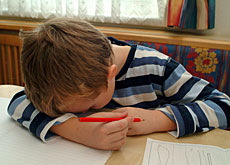
Truancy problem “underestimated” in schools

Roughly half of Swiss schoolchildren skip school, according to a study published on Wednesday by the Swiss National Science Foundation.
The author of the study said the quality of the schools, including the teacher-pupil relationship, played a decisive role in truancy cases.
The foundation said truancy has been underestimated up until now, with school authorities often tolerating it and failing to discuss the problem openly.
The study found that every second pupil between the ages of 12 and 17 skips classes at least once during his or her time in school and every third child plays truant once a semester.
About five per cent of the 4,000 students in nine German-speaking cantons questioned for the survey admitted to missing classes intentionally five times or more in the past six months.
More than a third said they had played truant for the first time between their fourth and sixth years at school.
In many cases, the pupils surveyed were vague when asked where they were during their absence. Three-quarters said they were home alone or had pretended to be sick.
Every third youngster who had played truant said their parents were willing to write a note excusing them from school. One in five said they had forged their mother or father’s signature.
About two-thirds of pupils said they stayed away simply because they did not want to go to school, while around 40 per cent said they had chosen to sleep in on the day or days in question.
A further 22 per cent gave problems with their teacher as a reason.
Poor marks
The author of the report, Professor Margrit Stamm of Fribourg University, said half of the students who skipped school several times a year belonged to the high-risk group of pupils who received poor marks and had to repeat grades.
Stamm described many in this group as juvenile delinquents.
She said youths falling into the second-largest group of truants, accounting for 37 per cent of the total, had unstable personalities. Many had poor relationships with their teachers.
The smallest group comprised students who said they got along well with their teachers but were under-challenged by the curriculum or were simply bored.
Stamm concluded that truancy is not only a problem of the individual but of the school as an institution as well. The quality of the education and school organisation plays an important role, she said.
The school authorities and school boards should see the problem as an educational one. She recommended they do more to prevent student absences by creating an effective “truancy system”.
“Schools and their teachers should be forced to take a closer look at the problem instead of turning a blind eye to it,” she said.
swissinfo with agencies

More
Swiss National Science Foundation
The study’s author surveyed 4,000 students at 28 schools in German-speaking Switzerland.
The pupils were between 12 and 17 years old.
Around two-thirds said they were too lazy to go to school, 42% said they preferred to stay in bed, and 40% said it was because their classes were boring.

In compliance with the JTI standards
More: SWI swissinfo.ch certified by the Journalism Trust Initiative




























You can find an overview of ongoing debates with our journalists here . Please join us!
If you want to start a conversation about a topic raised in this article or want to report factual errors, email us at english@swissinfo.ch.